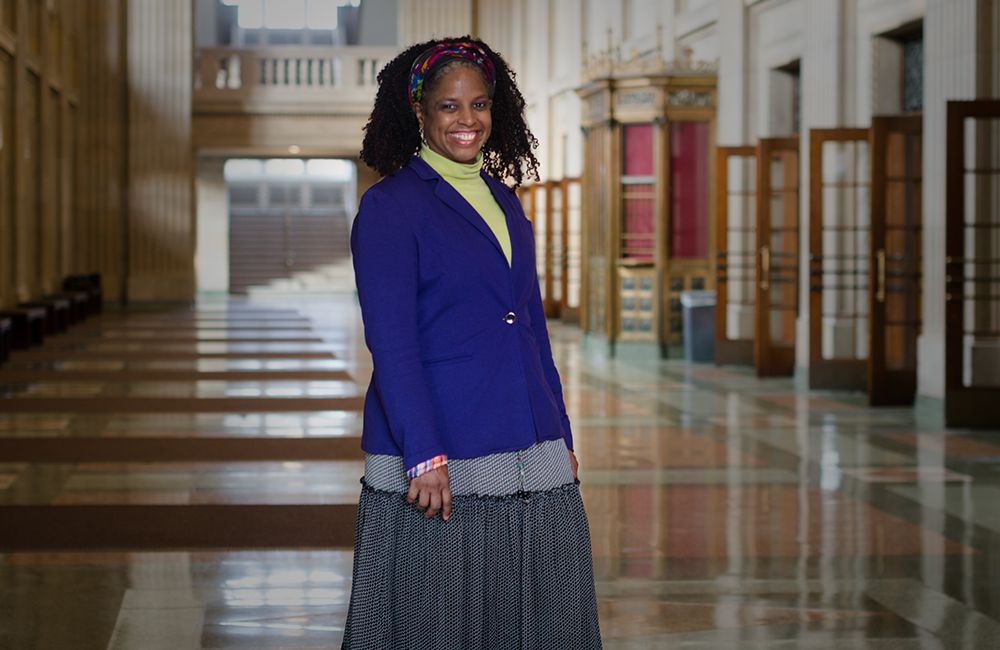When Nicola Alexander published her first textbook in 2012, she included a dedication to her daughter: “For whom I always want to make a difference.”
Alexander, an associate professor in the Department of Organizational Leadership, Policy, and Development (OLPD), frames all of her work around making a real-world, tangible difference in the lives of others. Her research and teaching push her to examine educational policy with a critical lens, to determine whether school policies and practices are truly beneficial to students.
When analyzing a particular policy, Alexander often asks, “Does it actually do what we want it to do?” For example, Alexander recently examined the effects of professional development spending, its interaction with the cultural makeup of teaching workforces, and whether it makes a difference to organizational competence overall.
It’s especially important, Alexander says, to analyze educational policy with a focus on equity.
“What does that mean when we say we emphasize equity?” she asks.
“How do we balance equity and notions of excellence? How do we balance flexibility and notions of standardization?”
The majority of Alexander’s research centers on educational policies currently in place in Minnesota schools. Some of her latest work includes an analysis of whether incorporating student achievement as an incentive in teacher evaluations makes a difference in students’ achievement overall.
“Including student achievement in teacher evaluation forms takes on very different elements, so we’re trying to unpack those elements,” Alexander says. “It’s a difficult issue to untangle.”
Inspired by challenge
Bridging the gap between policies and their real-world implications is a challenge Alexander often faces. At the same time, she says, working through those challenges to see her work impact others’ lives is a huge source of inspiration.
Before she wrote the textbook Policy Analysis for Educational Leaders, Alexander recalls feeling that the texts she and her students were reading in class did not fully meet their needs. After her book was published, colleagues told her they were using it in their own classes. If something she has written helps others do the work she values, Alexander is gratified.
Raising her daughter has also influenced the way Alexander sees the effects of her policy work and research. While she’s always been interested in education and its impact on kids, Alexander says she now also envisions what certain effects will look like for Alexis and her peers.
“I volunteer a lot,” says Alexander. Beyond her University teaching schedule, for example, she spends every Wednesday morning helping out at her daughter’s middle school and teaches catechism at Saint Peter Claver Catholic Church in St. Paul. She values volunteering as a practice that affords her a close-up view of educational dynamics and issues in her community. “I can see that having caring adults in a building matters to kids,” she says.
The promise of education
Before Alexander came to the University in 1999, she felt the pull toward the field of education from several directions. Originally from Jamaica, Alexander’s mother and sister both pursued careers as teachers.
While completing a Ph.D. in public administration and with a concentration in public finance at State University of New York (SUNY) Albany, Alexander worked with an adviser who was also passionate about educational policy. That led her to focus much of her research on education.
“I was drawn to education and its promise,” says Alexander. “It may sound trite, but schools and education are a major avenue of changing the world and making it a better place.”
“If you want to make an impact on people’s lives, that’s how you can do it.”
Each semester, Alexander helps the graduate students in her classes understand policy creation and analysis as well as the economics of education and school finance. It’s a profession where you are always questioning whether you can do it better, she says, but the work is always rewarding.
“There’s a lot of love involved in being an associate professor or a teacher or a faculty member of any kind,” Alexander says. “You get your ego bruised somewhat if you feel you didn’t do it perfectly or the class didn’t go as well as you would have liked … but there are so many other benefits to the field that make it worthwhile.”
The familiarity and community within OLPD and the department’s dedication to equity and fairness make it a welcoming place in the college to faculty like Alexander and to students as well.
“You will have supportive faculty here and rich ideas,” says Alexander. “If you value curiosity and informing that curiosity in a meaningful way, then this is a good place to be.”
Learn more about Nicola Alexander and the Department of Organizational Leadership, Policy, and Development.
Story by Ellen Fee | February 2016
